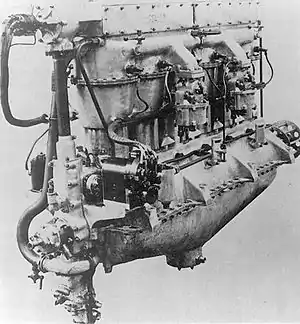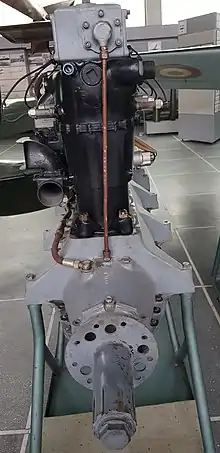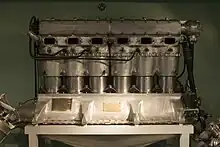Siddeley Puma
The Siddeley Puma was a British aero engine developed towards the end of World War I and produced by Siddeley-Deasy. The first engines left the production lines of Siddeley-Deasy in Coventry in August 1917, production continued until December 1918. At least 4,288 of the 11,500 ordered engines were delivered, orders were cancelled following the Armistice. Production was continued under the name Armstrong Siddeley Puma when the manufacturer was bought by Armstrong Whitworth and became Armstrong Siddeley.
| Puma | |
|---|---|
 | |
| Siddeley Puma | |
| Type | Inline engine |
| National origin | United Kingdom |
| Manufacturer | Siddeley-Deasy |
| First run | 1917 |
| Major applications | Airco D.H.9 |
| Developed into | ADC Nimbus |
The engine was based on a previous B.H.P engine which was also developed as the Galloway "Adriatic."
Applications
- The Puma engine was used in the British World War I bomber aircraft, the Airco D.H.9. In use it proved to be highly troublesome, making the aircraft significantly inferior to the type it replaced. The engine was also installed untidily, with the cylinder heads protruding. The D.H.9, as a type, was improved by replacing the Puma engine with the Liberty 12 to make the D.H.9A.[1]
- The unit was used in the first prototype of the Airco DH.10 Amiens in a twin-engined pusher configuration but as performance was unsatisfactory, alternative engines were used in a subsequent prototype of the type and production models.
- Short Silver Streak (1920)
Specifications (Puma)

Siddley Puma in National Military Museum, Romania.
Data from Lumsden[2]
General characteristics
- Type: 6-cylinder water-cooled inline aircraft piston engine
- Bore: 5.71 in (145 mm)
- Stroke: 7.48 in (190 mm)
- Displacement: 1,149 in³ (18.832 L)
- Length: 69.9 in (1,175 mm)
- Width: 24 in (610 mm)
- Height: 43.6 in (1,107 mm)
- Dry weight: 645 lb (293 kg)
Performance
- Power output:
- 250 hp (186 kW) at 1,400 rpm for takeoff
- 265 hp (198 kW) at 1,500 rpm for short-term maximum power
- Specific power: 0.23 hp/in³ (10.5 kW/L)
- Fuel consumption:
- 14 US gal/h (54 L/h) at cruise
- 67 US gal/h (258 L/h) at short-term maximum power
- Power-to-weight ratio: 0.41 hp/lb (0.67 kW/kg)
See also

Siddeley-Deasy Puma at the Canada Aviation Museum
Related development
Comparable engines
Related lists
References
Notes
- Munson, Kenneth "Aircraft of World War I". Ian Allan 1967. ISBN 0-7110-0356-4
- Lumsden 2003, p. 86
Bibliography
- Lumsden, Alec. British Piston Engines and their Aircraft. Marlborough, Wiltshire: Airlife Publishing, 2003. ISBN 1-85310-294-6.
External links
Wikimedia Commons has media related to Siddeley Puma.
- "The Siddeley Aero Engines: The "Puma"". Flight. XI (14): 429–431. 3 April 1919. No. 536. Retrieved 12 January 2011. Contemporary technical description of the engine with photographs.
- The Virtual Aviation Museum
This article is issued from Wikipedia. The text is licensed under Creative Commons - Attribution - Sharealike. Additional terms may apply for the media files.